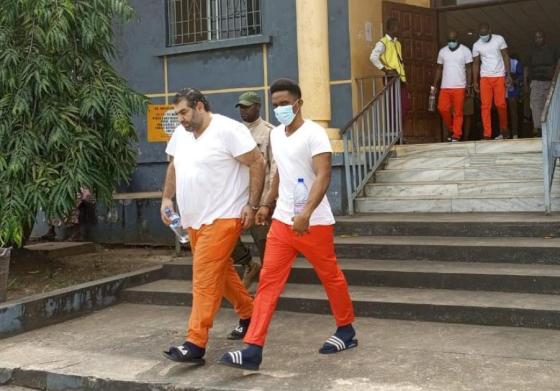Liberia: ‘Rotten Handcuffs’ Debacle Disrupts Trial in US$100M Cocaine Case

— Judge orders defendant taken to a welding shop to have cuffs removed
Hearing in the US$100 million drug trafficking case on March 28 was halted for hours as correction officers were finding it difficult to remove the handcuffs from the hands of one of the four defendants in the courtroom.
Criminal Court ‘C’ Judge Blamo Dixon could not go ahead with court proceedings as he was constrained to delay the hearing upon noticing the unfortunate incident.
The incident had defendant Oliver Zayzay experiencing excruciating pain as he and other co-defendants were escorted from the prison compound to the courtroom on Capitol Hill. The handcuffs were tied on Zayzay' and the co-defendants.
Sadly for Zayzay on Tuesday, when he and other defendants arrived along with the jury, who had been kept under the basement of the Temple of Justice building housing the court, his handcuffs could not be opened despite all efforts.
The incident brought the court to a standstill, forcing the jury to be driven back to their basement and a compulsory recess for Dixon.
So after hours, the officers could not remove the handcuffs. The court intervened to allow the officers to take the accused to a welding shop to have the handcuffs cut, which they successfully did, and the case resumed hours later.
Dixon said he regretted the situation that led to the hours of delay but warned the Ministry of Justice to buy new and effective handcuffs for their officers.
“The case was delayed because the Ministry of Justice put rotten handcuffs on the hands of one of the defendants and the officers could not open them,” Dixon furiously said.
“The officers had to go to a welding shop, where they used a hyssop blade before it could be opened. I am warning the ministry to buy new handcuffs for your officers, Dixon maintained.
The trial later resumed with the prosecution's fifth witness, Superintendent Larry Brown, the chief of the Anti-Narcotic Unit of the Liberia National Police, testifying about the defendant’s connection to a Brazilian named Augustavo Henrique, alleged to be a notorious drug dealer in the world.
Henrique, according to witness Brown's testimony, had absconded from the country to avoid being prosecuted. Brown had testified that he was one of the investigators whose investigation led the Grand Jury for Montserrado County, to draw an indictment against the defendants for the crimes of unlicensed importation of controlled drugs, unlicensed possession of controlled drugs, money laundering, and criminal conspiracy.
Brown also testified that the defendants were charged after one of them, Malem Conte, had his phone seized with photos of the container that contained the drug found in it.
The case stems from the US$100 million cocaine bust on October 1, 2022, in which one Oliver Zayzay, a Liberian national, and some of his foreign associates were arrested after seeking to purchase what appeared to be a shipping container full of fresh frozen pig feet from a refrigerated storage facility in Monrovia.
The defendants had initially offered to pay the owners of the container, AJA Group Holdings, the sum of US$200,000 for the entire container, which, at the time, cost less than US$30,000.
But when the defendants, within less than eight hours, doubled their offer to US$400,000 and, finally, to US$1 million, AJA Group said they were certain that Zayzay and his associates were dealing with a serious case of narcotics trafficking.
The company said they contacted the United States Ambassador, a move that brought both the American and Liberian anti-narcotics law enforcement agents into the picture and caught the suspects red-handed.
The US$100 million cocaine bust is believed to be the biggest arrest in terms of street value on the African continent so far.
